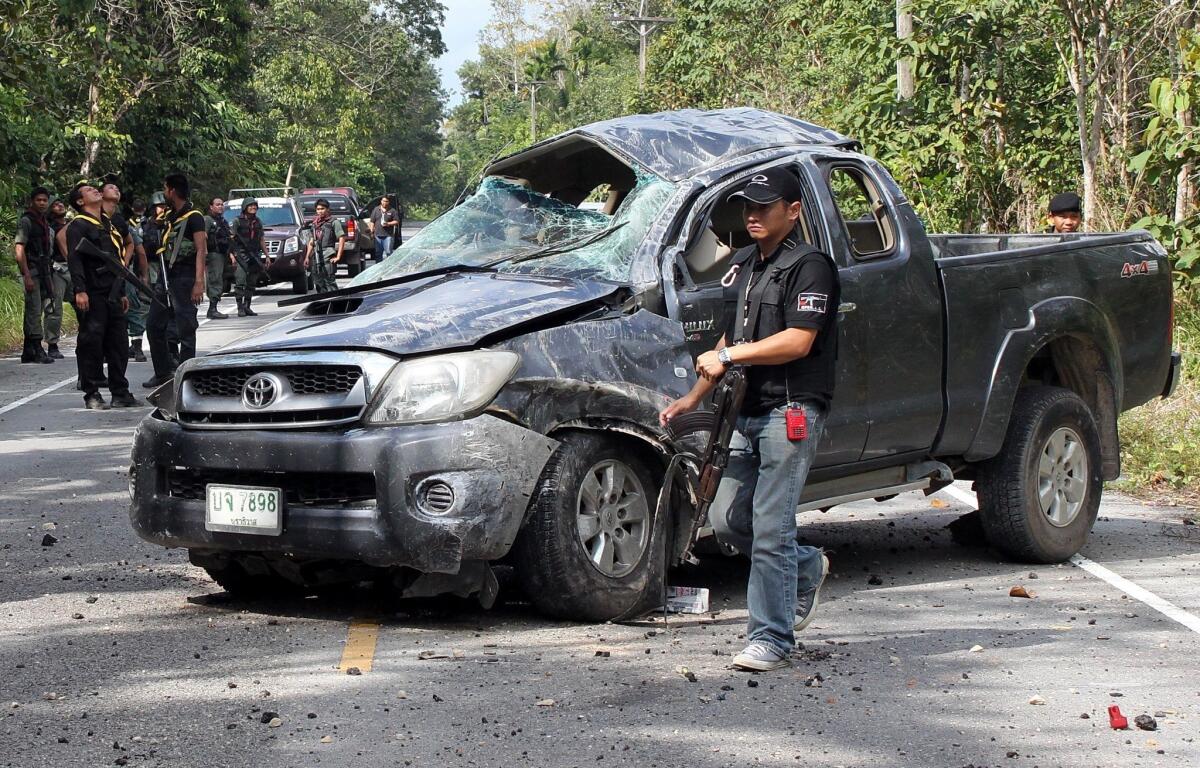Thai government, Islamic insurgents agree to formal talks

- Share via
NEW DELHI – The Thai government agreed Thursday to hold its first formal talks with Muslim rebels operating along the country’s southern border, a potential breakthrough in a conflict that has claimed more than 5,000 lives since 2004.
Analysts reacted to the development with some optimism but cautioned that various previous peace efforts had failed.
“It looks like good news,” said Kraisak Choonhavan, an ex-lawmaker and the son of former Prime Minister Chatichai Choonhavan. “It’s difficult to say whether this could lead to a possible end to violence.”
A great deal will depend on who’s on board within the rebel camp, he added.
The four-paragraph deal, brokered by Malaysia and signed in Kuala Lumpur between the Thai government and one of the principal insurgent groups known as the National Revolution Front, says security will be provided for working group members who are willing to enter a peace dialogue and respect different viewpoints on the other side. Talks are scheduled to begin in mid-March.
Hours after the deal was formalized, Malaysian Prime Minister Najib Razak and Thai Prime Minister Yingluck Shinawatra met in the Malaysian capital to discuss its terms.
While there have been talks between the two sides for years, these have taken place through back channels, allowing those involved to distance themselves when it suited them. What’s significant about this initiative, analysts said, is that the Thai and Malaysian governments have put their prestige on the line.
“The Thais have been reluctant to move down this road,” said Anthony Davis, Bangkok-based analyst with IHS Jane’s, a security publisher. “Once you acknowledge the insurgents as a legitimate entity, it’s much harder to walk out of the room.”
The rebels, concentrated in four Muslim-majority provinces of southern Thailand, seek greater cultural and political autonomy in the Buddhist-majority country. While they share the Islamic religion with Malaysia, most insurgents are less interested in teaming up with Kuala Lumpur than recreating the independent Islamic sultanate of Pattani, which lasted four centuries until it was absorbed by Thailand in 1909.
The insurgency is composed of several groups that don’t acknowledge a centralized leadership structure, however, and it remains to be seen how cohesive these might be in any future talks. Semantics will also be important. Many Thais have traditionally bridled at any suggestion of “autonomy,” opposing special treatment for the troublesome provinces.
Each side comes into the agreement with their own interests. “It’s connected to the domestic politics of Malaysia and Thailand, like a tango,” said Kavi Chongkittavorn, an executive with Thailand’s Nation media group. “We’ll also have to wait and see if there’s less violence in the next two weeks.”
For Thailand and Malaysia, a peace deal would offer an end to protracted bloodshed, the promise of regional stability and economic dividends, including the return of tourists long fearful of getting caught in the cross-fire. For the Malaysian prime minister, an added advantage is being seen as a peacemaker in a conflict involving Muslims in advance of a general election due by late June.
The rebel groups have stepped up attacks in recent weeks -- including a botched Feb. 13 raid on a Thai naval base that killed 16 militants -- hoping to pressure Bangkok to the bargaining table. A decade ago they were dismissed by Thailand’s then Prime Minister Thaksin Shinawatra as “sparrow bandits.” Now they’re seeking formal recognition.
Some movement leaders may also believe that they can achieve more through political negotiation than armed conflict.
“God willing, we will do our best to solve the problem,” said Hassan Taib, head of the National Revolution Front’s liaison office in Malaysia, who signed the agreement along with Thailand’s National Security Council head Lt. Gen. Paradorn Pattanathabutr. “We will tell our people to work together.”
Bangkok estimates that it’s facing some 9,000 militants in loosely affiliated village-level cells, while Paradorn said earlier this week that fewer than 1,000 insurgents are living on the Malaysian side of the border.
In recent years, they’ve become more adept at launching major attacks, better organized, more aggressive and ruthless. Their targets are often teachers, police and others seen as symbols of the Thai state. Deep South Watch, an analyst group, says 484 people were killed in attacks in 2012.
Most observers acknowledge that a lot could still go wrong. One early barometer will be whether violence abates over the next few weeks. “This is a big step forward,” said Davis. “Whether the talks come to anything, however, is difficult to see right now.”
ALSO:
U.S. official: Iraq continues to allow Iranian overflights to Syria
Three dead as gunman opens fire on colleagues at Swiss business
Thousands jam St. Peter’s Square for pope’s last general audience
More to Read
Sign up for Essential California
The most important California stories and recommendations in your inbox every morning.
You may occasionally receive promotional content from the Los Angeles Times.










